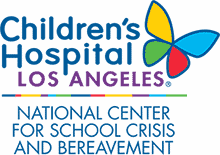September 2017
The following brief essay was written by a college student who experienced the death of her father in the attack on the World Trade Center on September 11, 2001. Anna reminds us both of the persistent impact of the death of a parent and the tremendous positive impact of a supportive and caring adult. At the time of the 16th anniversary of the events of 9/11, let us each remind ourselves not only of the enduring negative impact of this crisis, but commit ourselves to make the effort to proactively to provide support and assistance. Children, youth, and young adults have enormous capacity for recovery after crisis and loss, but they need—and deserve—the support of all of us to reach that potential.
When I was in the 6th grade, I was interviewed for the National Center for School Crisis and Bereavement’s Coalition for Grieving Students project, during which I said that I wished in the classroom, a teacher would come to me and ask how they could best address a class situation involving 9/11 and the discussion of my personal traumatic history. So many times, I felt that teachers would try to diffuse a situation by not making a scene in class and treat me like the rest of the students, but in doing so they ignored me, the grieving student. Yes, I appreciated being a part of the rest of the students and I am grateful that a teacher never approached me in front of my peers, but in the years directly following 9/11 when my grief was fresh, I never felt totally heard or understood.
To a young student, peers and peer pressure can agitate traumatic emotions. For example, in the first grade when learning math with blocks, my classmate built the “Twin Towers” and knocked them down with his fist. But peers can also relieve the grief of a fellow student. Every September, other students in my school, even the ones I wasn’t close to, would offer their support and their ears if I needed someone to talk to. I always felt awkward about the influx of people addressing my trauma, but it was warm and comforting to know that my peers cared.
In the classroom, it’s nice to be treated like the other students, but without the teacher directly approaching me, I never felt the same warm and comforting feeling when my grief made me feel like I didn’t belong.
And in treating a grieving student like a normal student, it might be easy to forget how much the trauma affects the student, no matter how long ago it was. It is easy for a teacher to forget because it is even easy for a grieving student like myself to forget. Sixteen years after 9/11, I sometimes feel as if I’m a rock and that I’m over it. But I am still proven wrong when I least expect it.
On the 13th anniversary of 9/11, an entire decade after my trauma occurred, I went to school directly following my attendance at my local 9/11 memorial with my family. I went into class with a smile on my face, and surprised and embarrassed myself when I burst out crying at a question I couldn’t answer. I was so embarrassed that I threw my head in my hands and excused myself.
Being treated like the average student didn’t help my grief. At that moment, I didn’t want to be looked at differently, but I couldn’t help but feel differently. No matter how hard I tried to push it away, I couldn’t turn off the grief. However, this time I did feel comforted.
In the 6th grade, I wished that my teachers would come to me and let me help facilitate how they could make me feel the most at ease in the classroom. In my Junior year of high school, after my 9/11 breakdown, my teacher went on with class as usual, but wrote me a letter afterwards. She offered her room to me whenever I needed it, and if I needed someone to talk to she was there. This private intimate interaction gave me space so I didn’t feel bombarded or punished, as well as the support to know I was understood that day, and every day. I no longer felt embarrassed for breaking down in class. I now felt calm knowing that my reaction was normal and that I didn’t have to attempt to hide my emotions. But above all I was relieved to know I had an ally in the classroom for whenever I felt “off.”
A teacher has the opportunity to make a student feel comfortable with their emotions regarding their trauma. Peers may help, but they may also instigate. The teacher as an authority figure can relieve a grieving student of holding back their emotions, and provide them with an outlet to feel like the normal student they want to be. Even when they feel like their grief alienates them from their peers, the relationship with the teacher can bring a grieving student back to Earth.


